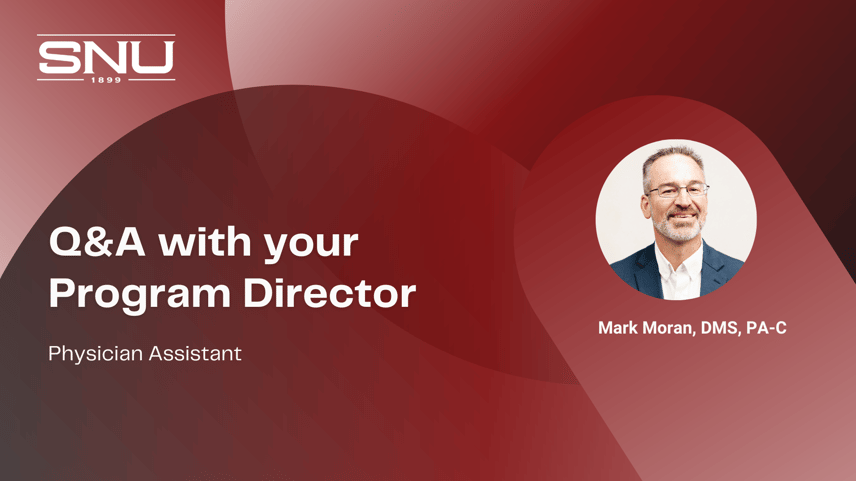
What do you believe is the most valuable element of your program?
The most valuable element of our program is the fact that we will be teaching medicine from a Christian perspective. One might then ask, what impact the Christian perspective has on medicine? I offer that medicine practiced from a Christian perspective impacts how one approaches various aspects of medical ethics, such as medical morality, patient autonomy, parental jurisdiction, end-of-life decisions, and more. In addition, this perspective impacts the patient-provider relationship and the counseling of patients. Lastly, the Christian perspective on the practice of medicine places patient care into the arena of service and
mission and not simply an occupational endeavor.
How/Why did you enter this field?
I was challenged during college to consider a health career by family members and fellow church members due to the service opportunities and job security that the healthcare profession offers. Growing up in Mississippi, I was not familiar with the PA profession. There was no such thing as a PA in Mississippi in those days (Mississippi was the last state to license PAs in the year 2000). While in college in Tennessee, I was introduced to the PA profession by a nurse I was helping while I was volunteering in an emergency department. This profession was very intriguing to me, it offered the healthcare career and stability I was looking for and seemed like a good fit for my personality and interests. The PA profession has opened many doors for me professionally, academically, and personally. Here at SNU, I am looking forward to teaching others who share the same interest.
How does a student succeed in your program?
Success in PA training boils down to "willingness". One must be willing to work hard; this includes not only a time commitment but a commitment to going the extra mile to ensure the mastery of topics. One must be willing to make temporary sacrifices while in school. PA school is a short 24 months and will be over before you know it. Most things can wait until after graduation. One must be willing to be taught. While this seems intuitive, PA students are high performers academically and personally. Attitudes can have as great an impact on learning as actual study time and lecture time. Approaching the curriculum with an open mind, willing to be taught will make the process easier and more pleasant. One must be willing to be corrected and to learn from mistakes. Although this is similar to being willing to be taught, there are distinct behavioral patterns among students not used to being wrong or corrected. Being wrong is part of the learning process, what you do with it and how you respond is what counts. Lastly, one must be willing to commit to lifelong learning. PA education does not end at graduation. Medicine changes fast. So, establishing learning patterns early in PA school will greatly impact lifelong learning and practice.
What advice would you give to someone interested in your program/industry?
PA school is one of the hardest professional master's programs that exists, but it is well worth the investment. My advice is to be as prepared as possible by learning as much as you can about the PA profession to ensure that this is what you are willing to work hard for.
Secondly, learn to appreciate textbooks. By this, I mean that you should learn to appreciate the original art of reading and utilizing textbooks. The amount of information available and clearly articulated in textbooks is usually overlooked by students who are used to PowerPoint lectures and notes. Lastly, learn to stay organized and to prioritize. The most common cause of students struggling in PA school is directly related to getting behind in one or more courses. Time management and prioritization is the key to not getting behind.
What course is your favorite to teach and why?
I enjoy teaching point-of-care ultrasound. Ultrasound is a real-time practical application of technology that can save patients’ lives, save time, and save money. Ultrasound is fun to utilize, and its applications are seemingly endless. Today, an ultrasound transducer can be attached to your cell phone and dropped into your pocket. We will integrate ultrasound technology into several courses throughout the curriculum, including anatomy, clinical correlations, surgery and emergency medicine, and imaging courses.
What is your favorite book/podcast? Or a good one you have read/listened to recently?
One of my favorite books is Bonhoeffer: Pastor, Martyr, Prophet, Spy by Eric Metaxas. It is a historically accurate and captivating story of Pastor Dietrich Bonhoeffer's role in resisting the Nazi party. Told by first-hand accounts and from original letters, one almost feels like they are present in Germany with Pastor Bonhoeffer. What a great model of commitment to Biblical truth, even in times of persecution!
Learn more about SNU's Physician's Assistant Program.
*SNU has applied for Accreditation-Provisional from the Accreditation Review Commission on Education for the Physician Assistant (ARC-PA). SNU anticipates matriculating its first class in January 2025, pending achievement of Accreditation-Provisional status at the September 2024 ARC-PA meeting.
Accreditation-Provisional is an accreditation status granted when the plans and resource allocation, if fully implemented as planned, of a proposed program that has not yet enrolled students appear to demonstrate the program’s ability to meet the ARC-PA Standards or when a program holding accreditation-provisional status appears to demonstrate continued progress in complying with the Standards as it prepares for the graduation of the first class (cohort) of students.
SNU will not matriculate students if Accreditation-Provisional status is not granted by the ARC-PA. If Accreditation-Provisional status is not granted, applicants will be notified, and any funds received by the university will be refunded.
Pending accreditation provisional approval, SNU PA program graduates will be eligible to take the Physician Assistant National Certifying Examination (PANCE) and subsequently qualify for application for licensure in all U.S. states and territories, including the specific curriculum requirements of CT, NY, OK, and VA. Some states may have additional requirements for licensure separate from the PA education. Individual graduates are responsible for achieving state-specific requirements not specific to PA training.










